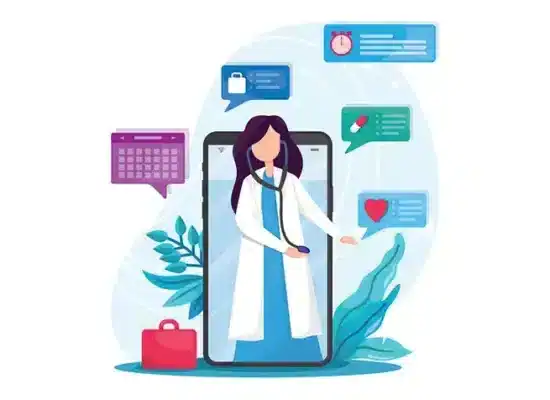Why Study Medicine Online?
Updated: December 3, 2024

While becoming a doctor still requires traditional on-campus medical school, you can choose to study medicine online and earn your undergraduate degree or pursue other positions within the healthcare field.
Online medical education offers the unique advantage of balancing studies with personal and professional commitments, allowing students to tailor their learning schedule around their lifestyle. Online platforms also maintain rigorous educational standards, often mirroring those of traditional medical schools, meaning that the quality of education you receive is not compromised.
The healthcare field is filled with different types of professionals that all work together to diagnose, treat and cure patients.

What is Medicine?
Medicine is the science and practice of diagnosing, treating, and preventing illnesses and injuries. It involves a wide range of healthcare professionals, including doctors, nurses, therapists, and specialists, all working together to care for patients and promote health. Medicine covers various fields such as surgery, pediatrics (children’s health), cardiology (heart health), genetics, and many others. This field requires a deep understanding of the human body and the use of different tools, medications, and techniques to help patients recover and maintain their health.
The practice of medicine combines both scientific knowledge and practical skills. Healthcare professionals must be able to assess symptoms, make accurate diagnoses, and create effective treatment plans. They also provide preventive care and educate patients on maintaining a healthy lifestyle. Medicine constantly evolves with new research and technologies, making it an exciting and dynamic field dedicated to improving and saving lives.
Why Study Medicine?
Choosing to study medicine is a decision that offers numerous rewards and opportunities. One of the most compelling and appealing reasons is the ability to drastically impact and change people’s lives. Medical professionals help patients recover and enhance their well-being by diagnosing and treating various health conditions. This sense of purpose and
fulfillment drives many to pursue a career in medicine. Medicine also provides a wide range of specialties, allowing students to find their specific areas of interest and passion.
A career in medicine ensures continuous learning and professional development. Advances in research, technology, and treatment methods keep the field dynamic and intellectually stimulating. Medical professionals must stay updated with the latest knowledge, which fosters an environment of constant growth.
It is a highly respected profession and offers strong job security and financial stability. These factors, combined with the opportunity to positively affect countless lives, make studying medicine really appealing and worthwhile.
What Are the Benefits of Studying Medicine Online?
Studying medicine online offers unique benefits that cater to the needs of modern students. From flexibility to innovative learning tools, online medical education provides a practical and effective alternative to traditional on-campus programs. Here are some key reasons to consider studying medicine online:
- Flexibility and Convenience: Online medical programs allow students to learn at their own pace and schedule, making it easier to balance studies with work or family responsibilities.
- Easy Access to Resources: Students can access lectures, videos, virtual labs, and interactive modules from anywhere with an internet connection, allowing for multiple reviews and personalized learning styles.
- Affordability: Online programs can often be more affordable than traditional on-campus programs, with savings on commuting, housing, and other expenses.
- Cutting-edge Technology: Online programs frequently incorporate the latest technologies, such as virtual reality simulations and interactive case studies, providing a modern and immersive learning experience.
- Preparation for Modern Healthcare: Using advanced technologies in online learning can better prepare students for today’s technology-driven healthcare environment.

Online Options for Studying Medicine
The digital era has opened doors for students to pursue medical and health-related education online. Whether you’re looking for a hybrid approach or 100% distance learning, many universities now offer flexible options to suit your needs. Here’s a breakdown of some institutions providing online opportunities in medicine and healthcare:
Keiser University
Keiser University offers bachelor’s degrees in various health-related fields, providing a solid foundation for careers in healthcare.
- Available Programs: Health Information Management, Health Science, Health Services Administration, Medical Laboratory Science.
- Requirements: High school diploma or equivalent; specific prerequisites vary by program.
- Duration: Typically 4 years for bachelor’s degrees.
- Tuition: Costs depend on the program and number of credits; financial aid is available.
Purdue University Global
Purdue’s online programs range from certificates to bachelor’s degrees, catering to a variety of healthcare roles.
- Available Programs: Certificates: Medical Assistant, Medical Billing and Coding, Medical Office Administration, Nursing. Bachelor’s Degrees: Health and Wellness, Health Information Management, Health Science, Healthcare Administration, Nursing.
- Requirements: High school diploma or equivalent; additional requirements such as background checks may be required for health-related programs.
- Duration: Certificate programs can range from a few months to a year, bachelor’s degrees typically take 4 years.
- Tuition: Varies by program; Purdue Global offers a tuition cap to keep costs manageable.
University of Massachusetts
UMass provides master’s programs for students who want to advance their careers in public health, nursing, and other fields.
- Available Programs: Public Health, Nursing, Nutrition, Health Informatics, Management.
- Requirements: Bachelor’s degree in a relevant field for master’s programs, specific prerequisites may vary based on specialization.
- Duration: Most master’s programs can be completed in 1-2 years, depending on the student’s pace and program structure.
- Tuition: Costs depend on the program and credits; financial assistance options are often available.
Can You Earn an MBBS or MD Online?
MBBS stands for ‘Bachelor of Medicine and Bachelor of Surgery.’ The rules for earning this degree vary by country, but in most places, you can’t get an MBBS degree fully online. This is because MBBS programs require a lot of hands-on training in hospitals and labs, which can’t be done virtually. While some theoretical parts of the course might be available online, practical experience is essential.
In the USA, an MBBS degree is equivalent to a master’s degree, covering extensive training that matches both a bachelor’s and a master’s degree in other countries. So, an MBBS in the USA is similar to getting an MD (Doctor of Medicine).
Just like the MBBS, you can’t earn an MD online either due to the necessary practical training and clinical experience. You must attend a traditional medical school to complete these studies.
You can choose from many specialties in medicine, such as general surgery, internal medicine, medical genetics, or radiology. Each specialty has its own challenges, and it’s hard to say which one is the toughest. Doctors usually pick their specialty based on their interests, skills, and available opportunities.
Study Health Science at University of the People
University of the People (UoPeople) offers a structured and practical approach to studying Health Science online. Here are key highlights of their program:
- Degree Offered: Bachelor of Science in Health Science
- Program Focus: Designed to build a solid foundation for advancing to a master’s degree in health science or entering the healthcare profession directly.
- Learning Model: Asynchronous, allowing flexibility to study on your own schedule without live lectures.
- Accreditation: Fully online and American-accredited, ensuring recognized and respected credentials.
- Advisory Board: Comprised of professionals from top-tier global institutions who oversee program quality and relevance.
- Tuition: Tuition-free, with minimal administrative fees to cover course assessments.
- Specializations: Offers specializations in Public Health, Human Biology, Epidemiology, and Behavioral Health through additional certificate programs.
- Application Requirements: High school diploma and proof of English proficiency.
UoPeople’s is a tuition-free model that is designed for high accessibility. It aims to make higher education available to students from over 200 countries, regardless of financial, geographical, or societal constraints.
FAQs
How do online medical programs compare to traditional ones?
Online medical programs offer flexibility and often lower costs. Their curriculum standards and content closely match traditional settings, making them ideal for students who need to balance other commitments alongside their education.
What are the admission requirements for online medical schools?
Requirements typically include a high school diploma or equivalent, transcripts, standardized test scores (if applicable), and specific prerequisites, depending on the program focus.
Can I work while pursuing an online medical degree?
Yes, the flexibility of online programs allows many students to work while studying, although time management is crucial to balance both effectively.
Are online medical degrees recognized by licensing bodies and employers?
Yes, provided the program is accredited, online medical degrees are recognized by licensing bodies and employers, similar to degrees from traditional programs.
Can international students enroll in online medical programs?
Many online medical schools accept international students, though it’s important to check specific program requirements and whether the degree is recognized in the student’s home country.
What is the typical class size in online medical courses?
Class sizes vary by program but are generally smaller, allowing for more personalized attention and interaction with instructors.
Can I transfer credits from another institution to an online medical school?
Many online medical schools accept transfer credits, but policies vary by school. It’s essential to consult admissions for evaluation.
How do online medical schools prepare students for licensing exams?
Online schools use rigorous curricula and resources such as virtual labs, simulations, and exam prep materials to adequately prepare students for licensing exams.
How do online medical schools foster a sense of community?
Online programs strive to create a collaborative learning environment through virtual classrooms, forums, group projects, and sometimes in-person meetups or residencies.
What career support services are available to online medical students?
Online medical schools typically offer career counseling, resume workshops, networking opportunities, and job placement services to help students transition into the workforce.

